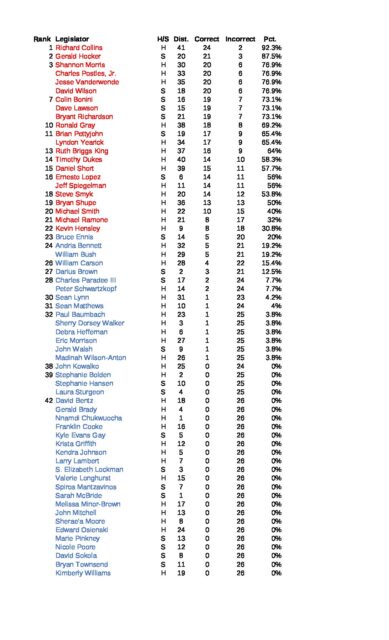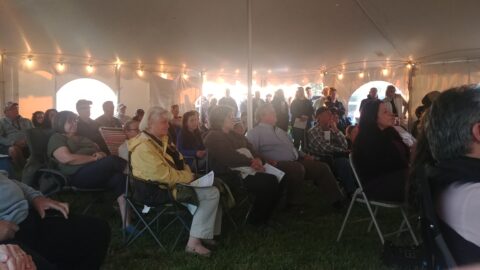First of all, my post isn’t really intended to be the discussion, although it may end up being so. I’m just passing the word along!
Anyway, every so often I get something of great interest from my longtime fan and friend Melody Clarke (back in her local radio and officeseeking days she was known as Melody Scalley, so Melody’s name may ring a bell with longtime readers – and the pun wasn’t intended.) Melody has been with the Heritage Foundation for awhile now as a Regional Coordinator, and her region includes ours.
In this case, she is announcing that the Heritage Foundation is putting together an intriguing panel event to be held right here locally in at the Crossroad Community Church just west of Georgetown (it’s right off Route 404.) I’m going to let her announcement take over from here before I jump back in:
Please plan to join us for a special event about critical race theory. This will be a panel discussion giving you the opportunity to hear from individuals with special knowledge across a broad spectrum on this issue. We hope you will attend in person, but there will also be an opportunity to join the event by livestream. Take advantage of this opportunity to ask panel members your questions about critical race theory. We want you to fully understand this ideology and the damaging impact it is having across all aspects of our culture and American way of life.
What is Critical Race Theory?
When: Thurs. July 29, 2021 6:30 PM to 8:30 PM
Where: Crossroad Community Church, 20684 State Forest Rd, Georgetown, DE 19947
Panel Discussion: Hear from dynamic speakers on the roots of critical race theory and how to identify it, as well as how it is infiltrating our schools, workplaces, and the military. Panelists will also be equipping attendees with action items for what you can do to stop it from dividing our children, families and nation.
Panel Moderator: Melody Clarke, Sr. Regional Coordinator, Heritage Action
Mike Gonzalez, Senior Fellow, Douglas and Sarah Allison Center for Foreign Policy and Angeles T. Arredondo E Pluribus Unum Fellow at the Heritage Foundation
Xi Van Fleet, A Chinese immigrant who has never before been involved politically. Compelled by her own experience in the Chinese Cultural Revolution, she has committed herself to warn the American people of the danger of Cultural Marxism and to help them to clearly see what is really happening in America.
Jonathan Butcher, the Will Skillman Fellow in Education at The Heritage Foundation.
Shawntel Cooper, Parent, Fight for Schools, Loving, dedicated wife, mother, (mommabear), who doesn’t conform to the popular opinion just because it’s the popular opinion.
Joe Mobley, Parent, Fight for Schools. He is host of the Joe Mobley Show and a disabled US Army veteran. Joe’s experience is exceptionally diverse and includes time in the military, law enforcement, church staff, and as a professional musician. He currently consults with one of the world’s largest and most influential firms.
Jeremy C. Hunt, writer, commentator and current student at Yale Law School. After graduating from West Point, he served on active duty as a U.S. Army Captain. Jeremy appears regularly on Fox News.
Stephanie Holmes, an experienced labor and employment professional and lawyer. Her legal career started at a large, international law firm where she represented employers in a wide variety of labor and employment matters, ranging from single plaintiff to complex class action cases. She then worked as in-house counsel for a Fortune 500 company.
Heritage Foundation announcement of the event.
This definitely sounds like it’s worth my time, and as an added bonus for me the Shorebirds are on the road that night so I’m not missing a home game!
CRT, and its cousin Action Civics, are topics I’ve visited recently on The Patriot Post, and – let’s channel Captain Obvious here – these are contentious subjects. Parents who oppose CRT in Delaware already have to gear up for a fight in their local districts, which will be mandated by the state in 2022-23 to teach public and charter school students about black history. And schools won’t necessarily be able to select criteria parents may deem appropriate, to wit:
The Department of Education shall develop and make publicly available a list of resources to assist a school district or charter school in creating Black History curricula. The Department shall consult with organizations that provide education about the experiences of Black people, or seek to promote racial empowerment and social justice.
House Bill 198 as passed, Delaware General Assembly, 151st Session.
Among these organizations being consulted are the NAACP, Africana Studies programs at the University of Delaware and Delaware State University (as well as their respective Black Student Coalitions), the Delaware Heritage Commission, and the Metropolitan Wilmington Urban League. I would hazard to guess this will be a stacked deck in favor of emphasizing “restorative justice.”
It’s also worth pointing out that we have racists in our midst – well, at least that’s what they will be called by the other side because they properly voted against this mess. In the House that list includes Representatives Rich Collins, Tim Dukes, Ronald Gray, Shannon Morris, Charles Postles, Jesse Vanderwende, and Lyndon Yearick, and among Senators the five were Gerald Hocker, Dave Lawson, Brian Pettyjohn, Bryant Richardson, and Dave Wilson. So the concerned parents do have allies.
Having said that, I think there’s certainly a place for black history in the schools – however, it should be taught from the perspective that it’s our shared history, whether black, white, brown, yellow, or red. When it comes to blacks, we are a nation which has evolved from keeping blacks in slavery and treating them as three-fifths of a person (who couldn’t vote anyway) to having blacks in all walks of life, including the offspring of black fathers elected as President and as Vice President within the last 15 years with the support of millions of black voters. (Not to mention numerous other elected and unelected government officials, sports figures, and CEOs of major corporations.) I’m not going to lie to you and say it was an easy or straight path toward a colorblind society, but I would argue that, until we made a big deal of race in the last decade or so, we were raising the most colorblind generation that we had known in the Millennials – unfortunately, Generation Z has the serious potential to backslide in that regard thanks to misplaced white guilt, due in no small part to the effects this “1619 Project” style of teaching history have already had on us regarding events which occurred over a century ago.
Acknowledging that history and attempting to learn lessons from it is one thing, but believing that past discrimination justifies future discrimination is quite another, and it’s wrong. I encourage my readers to attend this seminar if they can, or just watch it to see what the race hustlers are up to now.







